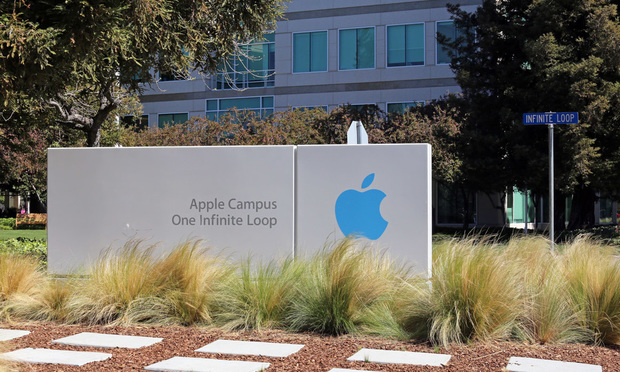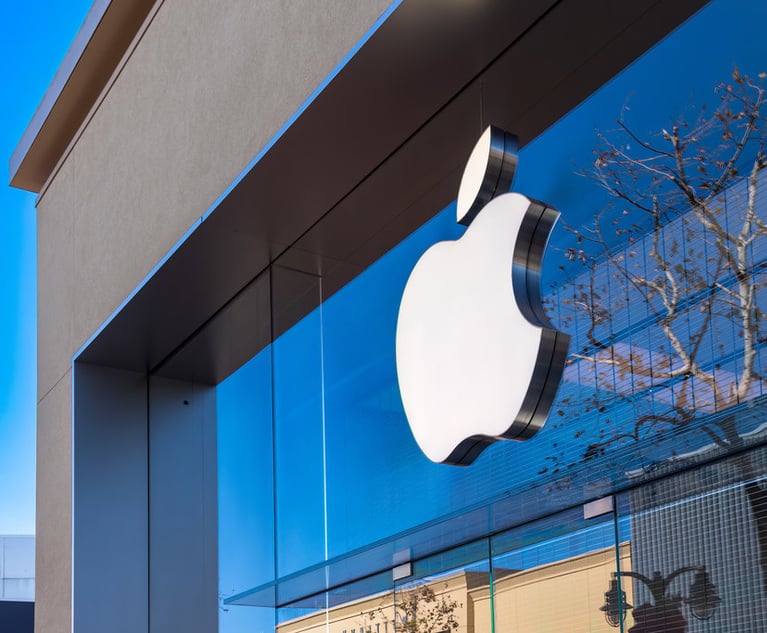Caltech and Quinn Emanuel Score $1.1B Verdict Against Apple, Broadcom
Quinn Emanuel lawyers told jurors that Apple had directed Broadcom to incorporate an error correction technology that infringed three Caltech patents.
January 29, 2020 at 09:25 PM
3 minute read
 The Apple world headquarters located in Cupertino on March 18, 2014.
The Apple world headquarters located in Cupertino on March 18, 2014.The California Institute of Technology and Quinn Emanuel Urquhart & Sullivan have won a $1.1 billion patent infringement award against Apple Inc. and Broadcom Corp. over Wi-Fi chip technology.
Jurors in the Los Angeles courtroom of U.S. District Judge George Wu of the Central District of California returned a verdict Wednesday of $838 million against Apple and $270 million against Broadcom over three patents related to error correction technology for Wi-Fi transmissions.
Caltech argued to the jury that Broadcom incorporated the infringing technology into its Wi-Fi chips at Apple's direction and has supplied them to more than 1 billion devices around the world. Apple has argued in court papers that Caltech's real beef is with Broadcom, not with Apple.
Quinn Emanuel's team featured partners James Asperger, Rachael McCracken, Kevin Johnson and Bill Price.
Price told jurors in his opening statement that Caltech professor Robert McEliece developed U.S. Patents 7,116,710, 7,421,032 and 7,916,781 with Ph.D. students Hui Jin and Aamod Khandekar. They were looking for ways to reduce errors in transmissions to satellites and faraway spacecraft. Their solution was a technology called an irregular repeat and accumulate code.
That invention represented "the best combination for speed, distance, reliability with the real-world benefits" of low complexity and battery conservation, Price told the jurors.
Apple and Broadcom were represented by Wilmer Cutler Pickering Hale and Dorr. Apple had sought to sever its case from Broadcom's last summer, arguing that "Apple is merely an indirect downstream party whose products incorporate the accused chips."
Apple had tried repeatedly to invalidate the patents at the Patent Trial and Appeal Board with only limited success. That took validity mostly off the table in the trial before Wu.
A Caltech spokesperson said the university is pleased with the verdict and grateful for the attention shown by jurors over the two-week trial. "As a nonprofit institution of higher education, Caltech is committed to protecting its intellectual property in furtherance of its mission to expand human knowledge and benefit society through research integrated with education," the spokesperson said.
This content has been archived. It is available through our partners, LexisNexis® and Bloomberg Law.
To view this content, please continue to their sites.
Not a Lexis Subscriber?
Subscribe Now
Not a Bloomberg Law Subscriber?
Subscribe Now
NOT FOR REPRINT
© 2025 ALM Global, LLC, All Rights Reserved. Request academic re-use from www.copyright.com. All other uses, submit a request to [email protected]. For more information visit Asset & Logo Licensing.
You Might Like
View All

'A Never-Ending Nightmare': Apple Sued for Alleged Failure to Protect Child Sexual Abuse Survivors

'The Hubris of Big Tech': Apple Hit With California Labor Lawsuit for Alleged Free Speech, Privacy Violations

Jury Says $118M: Netlist Wins Another Patent Verdict Against Samsung
4 minute readLaw Firms Mentioned
Trending Stories
- 1How ‘Bilateral Tapping’ Can Help with Stress and Anxiety
- 2How Law Firms Can Make Business Services a Performance Champion
- 3'Digital Mindset': Hogan Lovells' New Global Managing Partner for Digitalization
- 4Silk Road Founder Ross Ulbricht Has New York Sentence Pardoned by Trump
- 5Settlement Allows Spouses of U.S. Citizens to Reopen Removal Proceedings
Who Got The Work
J. Brugh Lower of Gibbons has entered an appearance for industrial equipment supplier Devco Corporation in a pending trademark infringement lawsuit. The suit, accusing the defendant of selling knock-off Graco products, was filed Dec. 18 in New Jersey District Court by Rivkin Radler on behalf of Graco Inc. and Graco Minnesota. The case, assigned to U.S. District Judge Zahid N. Quraishi, is 3:24-cv-11294, Graco Inc. et al v. Devco Corporation.
Who Got The Work
Rebecca Maller-Stein and Kent A. Yalowitz of Arnold & Porter Kaye Scholer have entered their appearances for Hanaco Venture Capital and its executives, Lior Prosor and David Frankel, in a pending securities lawsuit. The action, filed on Dec. 24 in New York Southern District Court by Zell, Aron & Co. on behalf of Goldeneye Advisors, accuses the defendants of negligently and fraudulently managing the plaintiff's $1 million investment. The case, assigned to U.S. District Judge Vernon S. Broderick, is 1:24-cv-09918, Goldeneye Advisors, LLC v. Hanaco Venture Capital, Ltd. et al.
Who Got The Work
Attorneys from A&O Shearman has stepped in as defense counsel for Toronto-Dominion Bank and other defendants in a pending securities class action. The suit, filed Dec. 11 in New York Southern District Court by Bleichmar Fonti & Auld, accuses the defendants of concealing the bank's 'pervasive' deficiencies in regards to its compliance with the Bank Secrecy Act and the quality of its anti-money laundering controls. The case, assigned to U.S. District Judge Arun Subramanian, is 1:24-cv-09445, Gonzalez v. The Toronto-Dominion Bank et al.
Who Got The Work
Crown Castle International, a Pennsylvania company providing shared communications infrastructure, has turned to Luke D. Wolf of Gordon Rees Scully Mansukhani to fend off a pending breach-of-contract lawsuit. The court action, filed Nov. 25 in Michigan Eastern District Court by Hooper Hathaway PC on behalf of The Town Residences LLC, accuses Crown Castle of failing to transfer approximately $30,000 in utility payments from T-Mobile in breach of a roof-top lease and assignment agreement. The case, assigned to U.S. District Judge Susan K. Declercq, is 2:24-cv-13131, The Town Residences LLC v. T-Mobile US, Inc. et al.
Who Got The Work
Wilfred P. Coronato and Daniel M. Schwartz of McCarter & English have stepped in as defense counsel to Electrolux Home Products Inc. in a pending product liability lawsuit. The court action, filed Nov. 26 in New York Eastern District Court by Poulos Lopiccolo PC and Nagel Rice LLP on behalf of David Stern, alleges that the defendant's refrigerators’ drawers and shelving repeatedly break and fall apart within months after purchase. The case, assigned to U.S. District Judge Joan M. Azrack, is 2:24-cv-08204, Stern v. Electrolux Home Products, Inc.
Featured Firms
Law Offices of Gary Martin Hays & Associates, P.C.
(470) 294-1674
Law Offices of Mark E. Salomone
(857) 444-6468
Smith & Hassler
(713) 739-1250






